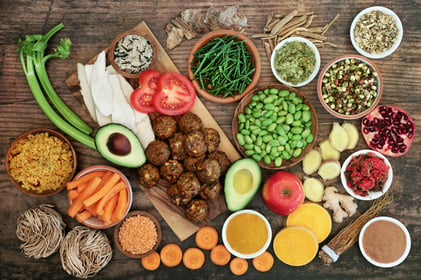Watch What You Eat: Your Guide to Staying Healthy as a Cancer Survivor
6 min read

Whether you’re still in cancer treatment or have completed it, you’re considered a cancer survivor. You’re surviving despite the challenges, and now the goal is to stay as healthy as possible.
There are many small steps you can take to improve your health and well-being during this time. If big changes feel overwhelming, tweak one habit at a time to build a healthier lifestyle to help you stay strong during and after treatment. Here’s your user’s guide to making small lifestyle changes that have a big impact.
Fuel Your Body with Healthy Food and Drink
While the saying “you are what you eat” isn’t completely accurate, what you choose to eat does play a big role in your health. There’s no single diet or cure-all for you to maintain a healthy weight and good health.
The key is to choose healthy foods whenever possible. Here are a few basics to keep in mind:
- Choose whole foods whenever possible. Whole foods are exactly what they sound like – they’re foods purchased in their whole form and therefore have not been processed. These foods are found in nature: fruit, vegetables, beans, nuts, seeds, whole grains, fish, poultry, low-fat dairy, and eggs. Processed food, such as certain breakfast cereals, breads, crackers, cheese, microwave meals, and hot dogs/cold cuts are often low in nutrients and contain unhealthy additives, including saturated fat and added sugar.
 Make your meal bright and colorful. Red, orange, deep green, and purple fruits and vegetables are foods that are high in nutrients, antioxidants, and cancer-fighting phytonutrients. Eating fruits and vegetables of all colors can help you reduce your risk of developing many different health conditions and strengthen your immune system. Red fruits and veggies, for example, contain lycopene, which is known for its cancer-fighting effects. One study found that eating tomatoes can reduce the risk of developing prostate cancer. Green leafy vegetables – think spinach, broccoli, kale – and brightly colored fruits are also packed with nutrients and antioxidants.
Make your meal bright and colorful. Red, orange, deep green, and purple fruits and vegetables are foods that are high in nutrients, antioxidants, and cancer-fighting phytonutrients. Eating fruits and vegetables of all colors can help you reduce your risk of developing many different health conditions and strengthen your immune system. Red fruits and veggies, for example, contain lycopene, which is known for its cancer-fighting effects. One study found that eating tomatoes can reduce the risk of developing prostate cancer. Green leafy vegetables – think spinach, broccoli, kale – and brightly colored fruits are also packed with nutrients and antioxidants.
- Choose lean protein sources. Protein is an important part of a healthy diet, and it’s especially critical for people who have cancer. Eating enough protein can help you maintain muscle mass and a healthy weight while undergoing treatment. But the type of protein matters. Protein derived from plant sources is particularly good for you, so fill up on lentils, grains such as quinoa, beans, seeds, and nuts such as unsalted walnuts and almonds, and natural peanut butter. When choosing protein from an animal source, look for lean, whole options. Avoid processed meats, including cold cuts, hot dogs, and sausage, which can contain carcinogens, and eat red meat only occasionally. Instead, choose lean cuts of chicken or turkey, or fish, which can contain healthy fats.
- Watch your fiber intake. Getting enough fiber in your diet from fruits, vegetables, and whole grains can improve health in many ways, including lowering cholesterol and maintaining healthy blood glucose levels. But in some cases, while undergoing cancer treatment, certain sources of fiber may aggravate treatment side effects, such as diarrhea or constipation. To achieve balance, try adding small amounts of fiber-rich food day to day or ask your medical provider about how much fiber is recommended for you each day. If some sources of fiber cause gastrointestinal issues for you, choose options that can be easier on the stomach, such as eating fresh fruit without a peel, cooked vegetables rather than raw, and nut or seed butters.
Other Foods to Avoid
In addition to avoiding processed meats, it’s also a good idea to minimize your caloric intake of fried foods, soft drinks, and alcohol, which can contain carcinogens that increase the risk of disease. They also contribute to unhealthy weight gain.
Because your immune system can be weakened during cancer treatment, you should also avoid common sources of foodborne illnesses, such as raw fish, soft-cooked eggs, and unpasteurized dairy products.
Sign up for a nutritional workshop at Rocky Mountain Cancer Centers (RMCC) to learn more.
Added Sugar and Cancer
Natural sugars in the form of fructose and lactose are found in many foods, including fruits and fruit juice, vegetables, and dairy products. That isn’t a bad thing – these foods play an important part in keeping you healthy, especially as a cancer survivor.
In general, keep an eye on the amount of sugar you consume. While there is no connection between cancer and sugar, added sugar, which is added to food during processing, is bad for your health in general. Consuming too much added sugar has been tied to an increased risk of many different health issues. Regularly consuming high-sugar foods is associated with being overweight or obese, which is a risk factor for many different conditions, including most types of cancer.
There’s another factor that may play a role, too. If you’re eating a lot of foods containing sugar, you probably aren’t eating enough of the good foods.
If you are female, aim to eat no more than 25 grams of added sugar per day, which is approximately six teaspoons of sugar – men should aim for no more than 36 grams or 9 teaspoons. Both sexes should keep a careful eye on the nutrition labels of prepared foods.
Get Moving, Often
When you’re undergoing cancer treatment and in the days and months after, exercise might be the last thing on your mind, but being active can actually help. Research shows exercise can be safe and healthy at all stages of cancer survivorship, but it’s best to check with your oncologist to see which exercises are right for you. Even if you can’t start a formal exercise routine, simply moving your body more can help improve your health and well-being in many ways. The benefits of exercise can include:
- Ease of falling asleep and staying asleep
- Ability to complete normal daily activities
- Improved appetite
- Increased energy
- Better immunity
- Improved muscle strength and bone health
- Fewer or less bothersome side effects
- Lower risk of experiencing the effects of depression and anxiety.
Being physically active can also help you maintain a healthy weight, keep your heart healthy and strong, and lower your risk of other health issues.
Looking to become more physically active? Start slowly. You can build up over time as your body becomes accustomed to activity. The American Cancer Society recommends that cancer survivors build up to between two and a half hours and five hours of exercise each week, which can be broken down into smaller chunks. Research indicates tai chi can also be very helpful to cancer survivors.
Pay Attention to Your Mental Health
When you’re facing a medical condition like cancer that affects overall health, it’s natural to focus on your physical symptoms, but your mental health is every bit as important. It’s expected that you will feel a wide range of emotions after receiving a cancer diagnosis and while undergoing treatment. Feelings of stress, anxiety, depression, loneliness, and anger are common among cancer survivors.
 Staying at your healthiest – and having the strength you need to go through treatment – requires you to take good care of yourself mentally, too. If you’re feeling overwhelmed, talk with your care team. They can offer advice and resources to help you cope, including connecting you with support groups.
Staying at your healthiest – and having the strength you need to go through treatment – requires you to take good care of yourself mentally, too. If you’re feeling overwhelmed, talk with your care team. They can offer advice and resources to help you cope, including connecting you with support groups.
Support groups, such as those offered at RMCC, play a particularly important role in helping cancer survivors face mental health challenges more easily. Engaging with others who are on a cancer journey and experiencing similar circumstances can help you feel less alone as you share and learn techniques for making it through.
You may also find other coping mechanisms helpful:
- Therapy sessions to talk through your experiences
- Meditation
- Yoga
- Creative activities like art, dance, poetry, and crafts
- Nature walks
Prioritize your whole self – physically, mentally, and emotionally. And ask for help when you need it. It’s ready and waiting for you.
At RMCC, your health is our priority, from diagnosis through recovery and beyond. Check out our library of cancer survivor resources.